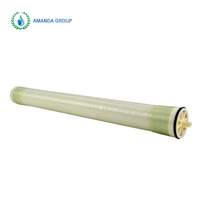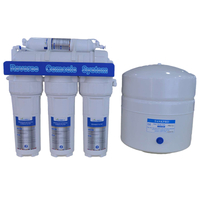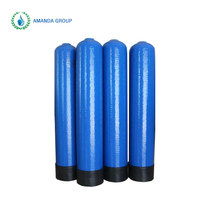PP Filter Cartridge
PP filter cartridge, also known as PP melt-blown filter cartridge, is made of polypropylene ultra-fine fiber thermally bonded into a three-dimensional micro-porous structure. The fiber forms a gradient distribution of micropore diameters along the flow of the filtered liquid, providing surface, deep, and precision filtration in one, capable of trapping impurities of different particle sizes. The filter cartridge accuracy ranges from 0.5 to 100μm, with a flux of 1.5 times or more compared to similar precision peak filter cartridges. It can be equipped with different types of end caps to meet various engineering installation requirements.
Wound Filter Cartridge
The wound filter cartridge is finely crafted by wrapping textile fiber yarn with good filtration performance around a porous skeleton. The yarn materials include polypropylene fiber, cotton fiber, etc. By controlling the tightness and density of the yarn winding, different precision water purifier filter cartridges can be produced, effectively removing suspended solids, particulate impurities, and achieving high purification effect for various liquids.
Folded Micro-porous Filter Cartridge
The folded micro-pore filter cartridge is made of polypropylene (PP) thermal spray fiber membrane, nylon (Nylonb), polytetrafluoroethylene (PTFE) micro-porous filter membrane, etc., and is a precision filter device with the advantages of small size, large filtration area, and high precision. The filtration accuracy ranges from 0.1μm to 60μm. The end caps and integral structural connections of the filter cartridge are sealed and bonded using thermal fusion. The filter cartridge joints include three international standard types: 222 joint, 226 joint, and flat joint. All products undergo strict testing before leaving the factory to ensure stable performance.
Activated Carbon Filter Cartridge
Activated carbon filter cartridge products are divided into two major categories: compressed activated carbon filter cartridge (CTO) and bulk activated carbon filter cartridge (GAC).
The compressed activated carbon filter cartridge uses high adsorption value bituminous activated carbon and coconut shell activated carbon as filter material, compressed and shaped by food-grade binders. The inner and outer layers of the compressed activated carbon filter cartridge are each wrapped with a filtering non-woven fabric to ensure that the carbon core does not shed carbon powder. Soft nitrile rubber sealing gaskets are installed at both ends of the carbon core, ensuring good sealing when the carbon core is installed in the filter housing.
The bulk activated carbon filter cartridge fills the required activated carbon granules into a special plastic shell, and the end caps are welded to the two ends of the shell by welding equipment. Non-woven fabric filter pads are placed at both ends of the shell to ensure that the carbon core does not shed carbon powder or black water. According to customer needs, the shell end caps can be made with different types of connectors. Interface types include: flat pressure type, pipe type (models: 4042, 4044, 4046, etc.).
Dual-stage Filter Cartridge
Upper stage: Polypropylene melt-blown filter cartridge with 5μm accuracy
Lower stage: Granular activated carbon filter cartridge with built-in 170g of activated carbon
Material: ABS, PP
Length: 250mm Outer diameter: 70mm Flux: 8L/S Total flux: 6-8T
Activated carbon indicators: Strength >90; Iodine value (mg/g) >950; Methylene blue value (mg/g) >120
Ceramic Filter Cartridge
The ceramic filter cartridge uses pure natural materials, ensuring that there is no secondary pollution during the use of the water purifier. Unlike a pure water machine, it retains beneficial mineral substances and effectively removes sediments, bacteria, rust, and has the advantages of never clogging, long service life, and excellent filtration effect. It is not prone to clogging and can adapt to extremely poor water quality conditions. Currently, the highest precision ceramic filter cartridge internationally is the dual-control membrane ceramic filter cartridge, with an average aperture of 0.1μm. Water filtered through this cartridge does not need to be boiled and can be consumed directly, meeting national standards for direct drinking water.
Resin Filter Cartridge
Resin is a porous, insoluble exchange material. The resin filter cartridge in the water softener is filled with millions of fine plastic beads, each containing many negatively charged exchange sites that absorb positive ions. When the resin is in a regenerated state, these exchange sites are occupied by positively charged sodium ions. When calcium and magnesium pass through the resin bed, they come into contact with the resin beads and displace the sodium ions from the exchange sites. The resin preferentially binds to the strong positive ions, and calcium and magnesium ions have a stronger charge than sodium ions. The replaced sodium ions then flow out of the soft water machine through the resin "bed", providing "soft" water. Eventually, all the resin exchange sites are occupied by calcium and magnesium, and the resin can no longer function.
Titanium Rod Filter Cartridge
The titanium rod filter cartridge has excellent properties such as corrosion resistance, high temperature resistance, high strength, easy guarantee of filtration accuracy, and easy regeneration. The titanium filter cartridge is formed by shaping titanium powder and sintering at high temperatures, so the surface particles are not easily shed. It can be used at temperatures up to 500-600°C in air and is suitable for filtering various corrosive media, such as hydrochloric acid, sulfuric acid, hydroxide, seawater, aqua regia, and chloride solutions of iron, copper, sodium, etc. It has excellent mechanical properties, can be machined, welded, and has high pressure resistance, with a maximum internal pressure strength of over 2MPa. Its filtration accuracy is easily guaranteed, and the pore rate can reach 35-45%, with uniform pore distribution and a large dirt holding capacity. Furthermore, its regeneration method is simple, and it can be reused after regeneration.
RO Reverse Osmosis Filter Cartridge
Filter cartridges using RO reverse osmosis membranes. Reverse osmosis technology: The original term is REVERSE OSMOSIS. It was developed by NASA, with the support of multiple countries, spending billions of dollars over many years of research. The principle of reverse osmosis is to apply greater pressure than the natural osmotic pressure on one side of the raw water, causing water molecules to reverse osmose to the lower concentration side. Since the aperture of the reverse osmosis membrane is hundreds to thousands of times smaller than viruses and bacteria, various viruses, bacteria, heavy metals, soluble solids, contaminated organic matter, and calcium and magnesium ions cannot pass through the reverse osmosis membrane, thereby achieving the purpose of softening and purifying water.
Stainless Steel Filter Cartridge
Characteristics of stainless steel filter cartridge:
Good filtration performance, providing uniform surface filtration performance for particle sizes from 2-200μm.
Corrosion resistance, heat resistance, pressure resistance, and good abrasion resistance.
Uniform pores, precise filtration accuracy.
Large flow rate per unit area.
Suitable for low and high-temperature environments; can be reused after cleaning, eliminating the need for replacement.
Applications: Petroleum and chemical industry pipeline filtration; refueling equipment, engineering machinery fuel filtration; water treatment equipment filtration; pharmaceutical and food processing fields; rated flow rate 80-200l/min; working pressure 1.5-2.5pa; filtration area (m2) 0.01-0.20; filtration accuracy (μm) 2-200 μm; filter material stainless steel woven mesh, stainless steel perforated mesh used for pre-filtering of heavy oil combustion systems, can also be used for chemical liquid filtration, with a precision of 100μm, and the filter cartridge material is stainless steel round micro-hole mesh. Suitable for pre-treatment and post-treatment systems in industries such as electronics, petroleum, chemical, pharmaceutical, and food, further purifying water with low suspended impurities (less than 2-5mg/L).
Oil Filter Cartridge
Multiple specifications of filter cartridges with different materials, with accuracies ranging from 0.5 to 80μm, meeting the processing needs of various industries and adapting to various types of oils.
Hydraulic Oil Filter Cartridge
Hydraulic oil filter cartridges are mainly used for filtering oil in hydraulic systems to remove particles and rubber impurities from hydraulic oil, ensuring the cleanliness of hydraulic oil and thus enabling the normal operation of the hydraulic system.



